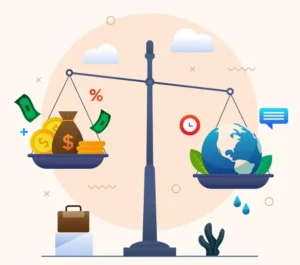The economic climate is changing at a dizzying rate as traditional jobs give way to gig and freelance labor. Many people work as freelancers, contractors, or temporary employees in the “gig economy” because they value independence, variety, and adaptability. But new monetary difficulties have emerged with this change.
Fintech, or financial technology, delivers novel solutions specifically designed to meet the demands of gig workers. Learn about the technologies changing the game for freelancers’ financial management in this article that delves into how fintech is changing the game.
The Gig Economy Boom: A New Employment Paradigm
1. Understanding the Gig Economy
Instead of traditional, full-time employment, the “gig economy” emphasizes temporary, contract work or freelancing. Many people who work as virtual assistants, graphic designers, freelance writers, or rideshare drivers have a lot of customers and tasks going at once, and they get to set their own hours.
The flexibility to choose tasks that meet one’s interests and abilities is only one of many advantages offered by this approach, which also allows one to work remotely. There are certain drawbacks, too, including less security in one’s financial situation, less predictability in one’s payment schedule, and the absence of more conventional employee perks.
2. Financial Challenges for Gig Workers
When compared to individuals in more conventional jobs, freelancers have a number of unique financial challenges. Among these difficulties are:
- Inconsistent Income: Budgeting and financial planning become more complicated for gig workers due to the inconsistency of their income, in contrast to salaried employees.
- Tax Obligations: Managing one’s own taxes, especially self-employment taxes, may be a daunting task for freelancers without the right resources.
- Lack of Benefits: Health insurance, retirement plans, and paid time off are not frequently provided to gig workers, so they have to make their own arrangements for these important benefits.
How Fintech is Empowering Freelancers
1. Streamlined Payment Solutions
Having dependable and efficient payment methods is a top need for gig workers. Tools that streamline payment processing and provide prompt access to cash are being offered by fintech technologies, which are meeting this requirement.
Instant Payments and Transfers: Platforms like Square and PayPal provide immediate payment options, letting freelancers easily manage their funds and receive payouts promptly. Because of the speed, there are less problems with cash flow and more financial flexibility.
Payment Aggregation: Financial technology apps like QuickBooks and FreshBooks consolidate payments from many sources, giving independent contractors a bird’s-eye perspective of their money coming in and going out. Financial administration is made easier and the administrative cost of tracking payments is reduced by this aggregation.
2. Intelligent Budgeting and Expense Management
For independent contractors to keep their finances stable and prepare for future costs, efficient budgeting and spending management are essential. Gig workers may better manage their money with the aid of fintech technologies that provide smart solutions.
Automated Expense Tracking: Apps like Receipt Bank and Expensify makes it easy to keep tabs on and organize your spending. Freelancers may streamline their financial management and tax preparation with the help of these AI-powered apps that scan receipts, classify expenses, and produce comprehensive reports.
Budgeting Tools: Freelancers can benefit from budgeting tools offered by fintech solutions like Mint and YNAB (You Need A Budget). These applications allow users to manage their spending, create financial objectives, and track their financial health. Users may gain insight into their spending habits and make realistic budgets that account for their income fluctuations with the aid of these tools.
3. Tax Management and Filing
Since they are solely responsible for their own tax responsibilities, freelancers naturally worry a lot about tax management. Thanks to new tax management solutions, fintech is making this procedure easier.
Tax Filing Software: Freelancers may get tax preparation tools on platforms such as TurboTax and H&R Block. Users are able to claim all allowable deductions and credits and stay in compliance with tax rules with the help of these tools, which they use to file their taxes.
Expense Deduction Tracking: To assist freelancers maximize tax savings and minimize taxable income, fintech tools like TaxSlayer and Shoeboxed help freelancers track and categorize eligible costs.
4. Financial Planning and Investment
Due to unpredictable income and the absence of employer-sponsored retirement plans, it can be tough for freelancers to plan for the future and manage savings. Gig workers may now better prepare for their financial future with the aid of fintech solutions.
Robo-Advisors: Platforms like Betterment and Wealthfront offer robo-advisors that provide automated investment advice and portfolio management. These services are accessible to freelancers looking to invest their savings and build wealth without needing extensive financial expertise.
Retirement Savings Accounts: Freelancers can find retirement savings choices with fintech platforms like Stash and Acorns. Individual retirement accounts (IRAs) and other investment vehicles may be set up and managed with the aid of these platforms, which makes long-term financial planning easier.
5. Access to Financial Products and Services
Access to conventional banking services and products might be difficult for freelancers. Financial technology is helping to close this gap by providing solutions that are specifically designed for gig workers.
Microloans and Credit Lines: Freelancers may access credit lines and microloans through platforms such as Upstart and Kiva. In order to assist gig workers with managing their cash flow and covering expenditures, these financial solutions provide accessible credit choices with flexible terms.
Digital Banking Services: Chime and N26 are two examples of fintech startups that provide digital banking services tailored to the requirements of freelancers. Among these features are fee-free accounts, adaptable overdraft protection, and seamless connection with popular money management apps.
The Benefits of Fintech for Freelancers
1. Increased Financial Control
Freelancers get more control over their finances with fintech technologies. Technology in the banking sector has made it easier for gig workers to keep track of their money and make smart choices by streamlining tasks like tax preparation, budgeting, and payment processing.
2. Enhanced Efficiency and Convenience
Freelancers may save time and effort and lessen their administrative load with the help of fintech solutions, which automate and integrate financial activities. Efficiency and convenience are enhanced by digital banking services, rapid payments, and automated expenditure tracking.
3. Better Financial Planning and Security
By providing access to investment opportunities, retirement savings programs, and tax management tools, fintech solutions help with improved financial planning and security. Freelancers may strengthen their financial footing and prepare for the future with the aid of these solutions.
4. Accessibility and Inclusion
By meeting the specific financial demands of gig workers, fintech works to increase accessibility and inclusiveness. Financing options that can be out of reach for freelancers include microloans, online banking, and robo-advisors.
The Future of Fintech and the Gig Economy
1. Continued Innovation
To meet the ever-changing demands of freelancers, fintech will be crucial as the gig economy keeps expanding. Further improvements to the freelancing experience will be made possible by ongoing innovation in payment methods, budgeting tools, and financial planning services.
2. Greater Personalization
More personalized financial advice, product suggestions, and services will be available in the future from fintech solutions that use artificial intelligence and data analytics. Freelancers will be able to better handle their own financial situations with this customization.
3. Integration with Emerging Technologies
New possibilities will arise for freelancers as fintech integrates with emerging technologies like blockchain and digital currency. Enhanced security, more transparency, and new financial products are all on the horizon thanks to these technological advancements.
4. Focus on Financial Education
Financial literacy training for independent contractors will get more attention as fintech develops further. Gig workers may improve their financial literacy and decision-making abilities with the aid of information and tools provided by fintech businesses.
Conclusion
When it comes to meeting the specific financial demands of independent contractors, fintech is spearheading the shift brought about by the gig economy. Fintech (financial technology) is improving the financial management of gig workers in many ways, including smart budgeting tools, simplified payment solutions, investment opportunities, and tax management.
Financial technology’s (fintech) ability to back independent contractors will be more important as the gig economy grows. The financial difficulties of freelancing may be better managed and gig workers can succeed financially by taking use of fintech technologies and tools. Thanks to fintech, the future of freelancer money management is here.
FAQs on Fintech Tools and Financial Management
What is a FinTech tool?
Any technological solution that helps people or companies better manage their money is called a FinTech tool. More efficient and successful financial management is possible with the use of these technologies, which might include payment processing systems, budgeting applications, tax management software, and investing platforms.
What is FinTech in financial management?
When it comes to managing money, “fintech” refers to the use of tech to automate and enhance financial services. Gig workers and freelancers typically have unique financial issues; this program addresses their special requirements by providing them with tools for budgeting, spending monitoring, tax preparation, and investing techniques. Financial technology (FinTech) solutions facilitate easier access to financial goods, more transparency in the financial sector, and the simplification of financial chores.
Is PayPal FinTech?
Yes, PayPal is considered a FinTech company. It offers digital payment solutions that facilitate online transactions, allowing individuals and businesses to send and receive money quickly and efficiently. PayPal’s services are particularly valuable in the gig economy, providing freelancers with immediate access to their earnings and simplifying payment processing.




